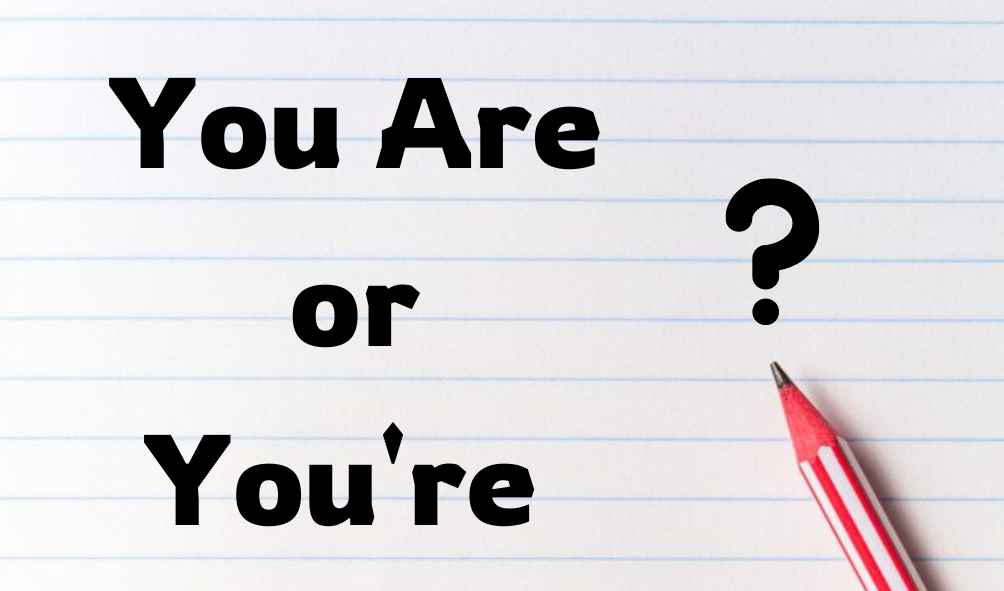You Are or You're: Which Is Correct?

You are and you’re are both grammatically correct, but they are used in different contexts.
You are: This is the full form of the phrase, and it is used when you want to explicitly state that someone or something exists in a certain state or performs a particular action. It’s more formal and often used in writing or formal speech.
Example:
- You are my best friend.
- Are you coming to the party tonight?
- They are going on vacation next week.
You’re: This is a contraction, which means it’s a shortened form of you are. It’s less formal and more commonly used in casual speech and informal writing.
Example:
- You’re my best friend. (Short for “You are my best friend.”)
- You’re coming to the party tonight, right? (Short for “You are coming to the party tonight, right?”)
- I hope you’re ready for the exam tomorrow. (Short for “I hope you are ready for the exam tomorrow.”)
Grammar rules:
- You are is the subject pronoun “you” followed by the verb “are.”
- You’re is a contraction formed by combining “you” and “are.”
- Contraction rules apply, where the apostrophe replaces the omitted letters (in this case, the “a” in “are”).
- Both “you are” and “you’re” can be used interchangeably depending on the formality of the context.
When to Use Each:
- Use “you are” in formal settings such as academic papers, professional emails, or public speeches.
- Reserve “you’re” for casual situations like texting, chatting with friends, or social media posts.
Tips for Correct Usage:
- Know Your Audience: Consider the formality of the context and your audience when deciding between “you are” and “you’re.”
- Proofread: Take a moment to proofread your writing to ensure you’ve used the correct form.
- Practice: The more you practice using “you are” and “you’re” correctly, the more natural it will become.
In summary, “you are” and “you’re” convey the same meaning, but “you’re” is the contracted form used in informal situations, while “you are” is more formal and commonly used in writing.
FAQs
You can say both “you are” and “you’re” when talking about being right. “Are” is regular, and “you’re” is short for “you are.” They mean the same thing, but “you’re” is more casual and used in everyday talk. So, whether you say “Are you correct?” or “You’re correct,” you’re saying the same thing: that someone is right.
Knowing how to use “you’re” in a sentence is important for clear English. “You’re” is short for “you are.” It shows what someone is doing or being. For example, in “You’re happy,” “you’re” means “you are.” To use it right, just swap “you are” for “you’re” in your sentence. This helps your writing be clear and correct.
Using “you are” is totally okay in English. It’s a regular way to talk about what someone is doing or being. For example, in “You are playing,” it means you’re doing the action of playing. So, don’t worry, saying “you are” is the right way, and it helps you express things correctly in English.
The right way to say it is “you’re welcome.” It’s short for “you are welcome.” This is what you say when someone thanks you. “Your welcome” is wrong here. “Your” is about owning something, not saying welcome. So, stick with “you’re welcome” to be polite and correct.
Yes, British people say “you’re welcome” too. It’s a polite way to respond when someone says thank you. So, whether you’re in Britain or elsewhere, “you’re welcome” is a friendly and polite reply to show you’re happy to help.
Sure, you can say “you are” instead of “you’re” in English. They mean the same thing. “You’re” is just shorter and more casual. It’s like saying “you are” quickly. So, use whichever one feels right for you, depending on how formal or informal you want to be.
People sometimes say “your” instead of “you’re” because they sound similar when spoken. “Your” shows ownership, like saying “your book.” “You’re” is short for “you are,” used to talk about what someone is doing, like “you’re reading.” Mistakes happen, especially when speaking quickly or writing casually. But knowing the difference helps us communicate clearly.